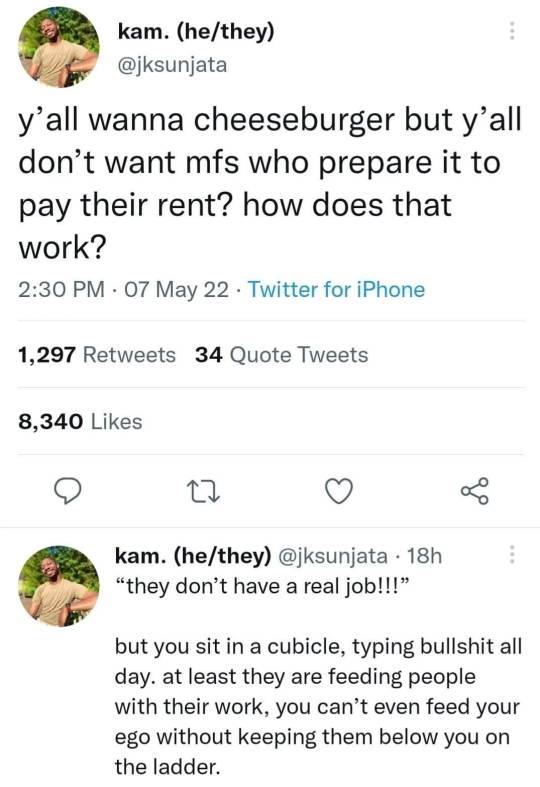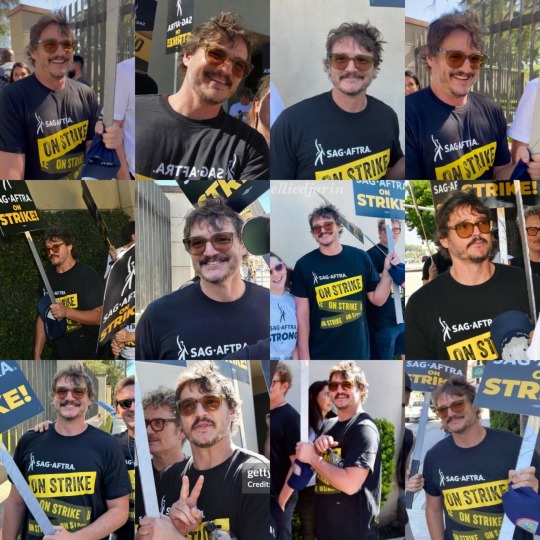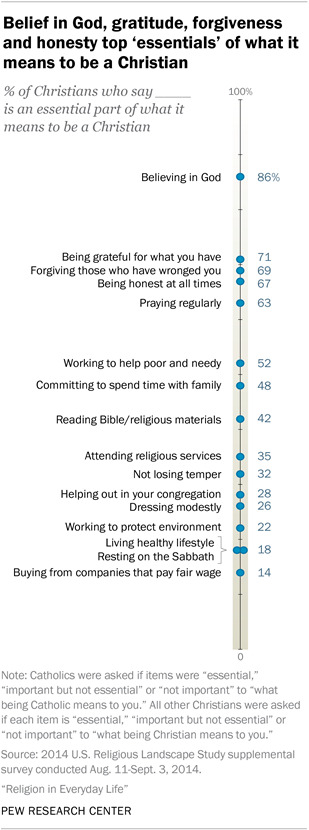#fair wages
Text

13K notes
·
View notes
Text

#cost of living#affordable housing now#rent controls now#fair wages#republican assholes#never trump#crooked donald#corporate greed
95 notes
·
View notes
Text
120 notes
·
View notes
Video
youtube
Oakland's Radical Plant Nursery Breaks the Prison Cycle
Permaculture instructor Andrew Millison journeys to East Oakland, California, to visit the legendary plant nursery Planting Justice, which primarily hires formerly incarcerated people. They provide a fair wage and benefits to former prisoners with unbelievable results: a 2% recidivism rate, compared to 60% for the State of California. The nursery itself has an incredible diversity of edible and useful plant species and varieties, custom selected to grow an epic permaculture garden.
ORDER YOUR PLANTS: https://plantingjustice.org/
#permaculture#oakland#planting justice#perennial#food forest#fruit trees#fair wages#edible city#edible plants
272 notes
·
View notes
Text

Pedro striking for himself and all actors! ✊🏼✊🏼👏🏼👏🏼


#pedro pascal#sag afta strike#sag aftra#fair wages#the mandalorian#star wars#din djarin#game of thrones#strange way of life#gladiator 2#grogu#joel miller#this is the way#the last of us#workingactor
90 notes
·
View notes
Text
Shamelessly reposting this because I want to emphasize, again, that this is the same crowd that called you an "essential worker" through their masks pulled down under their noses in 2020.
Funny how quickly fast-food service workers then became unskilled laborers not worth 40k, knowing that the average cost of rent alone is more than 42. FUCKING. PERCENT. of that income.
I really hope we remember this next time they call us "heros" for keeping their lifestyle afloat.
23 notes
·
View notes
Text
Transit workers in the Comox Valley and Campbell River — neighbouring regions on the northern half of B.C.'s Vancouver Island — walked off the job Friday, citing unfair wages and excessive overtime.
Unifor Local 114's bargaining committee had come to two negotiated agreements with the employer, Pacific Western (PW) Transit, but members overwhelmingly rejected both.
More than 70 employees — which includes bus and handyDART operators, mechanics, cleaners and support staff — say they want wage parity with transit workers in other B.C. communities like Victoria, Whistler, and the Fraser Valley.
They say better wages would also help with recruitment and retention, which would mean existing employees would have to work less overtime.
Continue Reading
Tagging @politicsofcanada
#cdnpoli#canada#canadian politics#canadian news#british columbia#strike#public transit#fair wages#workers rights
35 notes
·
View notes
Text

Capitalists
#capitalism#capitalist society#capitalist system#capitalists#comics#comic#cartoons#cartoon#memes#meme#class war#poverty#homeless#minimum wage#wage slavery#living wage#wage theft#wage war#fair wages#slave wages#livable wages#ausgov#politas#auspol#tasgov#taspol#australia#fuck neoliberals#neoliberal capitalism#anthony albanese
18 notes
·
View notes
Text
New coworker told me yesterday that one of the CRM companies they are currently working for is only paying them $14/hr. This, for a job that requires a 4-year degree + field school, in an area that has a fairly high cost of living. Told them to quit that shit right away, and demand what they’re worth. Even a newbie archaeologist shouldn’t be making less than $20/hr, though $25/hr is closer to ideal. Don’t be afraid to discuss your wages with your coworkers. A low wage is an employer’s shame, not yours.
190 notes
·
View notes
Text
AN OPEN LETTER to THE U.S. CONGRESS
Put the Good Jobs for Good Airports standards in the FAA reauthorization bill!
104 so far! Help us get to 250 signers!
I’m calling on you to stand with working people, passengers and our communities by supporting Good Jobs for Good Airports standards (GJGA) in the FAA reauthorization bill. Airports should and can be strong, vibrant drivers of good jobs in every part of our country. The Good Jobs for Good Airports standards are central to that mission and our nation’s future prosperity. Billions of our public dollars are invested in our nation’s aviation system every year, and we must ensure that our public resources serve the public good. That includes ensuring airports better serve the needs of our families, our passengers, our communities and the airport service workers who make it all possible.
It is evident that our air travel industry is in crisis. From record flight cancellations during summer travel peaks to mountains of lost luggage during the holiday travel season. Airports are critical publicly-funded infrastructure vital to the health of our local communities and global economy, but right now airports aren't working the way they should for travelers or airport service workers — a largely Black, brown, multiracial and immigrant service workforce. These working people, including cleaners, wheelchair agents, baggage handlers, concessionaires and ramp workers, keep airports safe and running smoothly even through a global pandemic, climate disasters and busy travel seasons. Yet many are underpaid and underprotected--even as some major airlines rake in record profit and billions of our tax dollars are invested in our national air travel system.
Domestic passenger numbers increased by 80% between 2020 and 2021, total industry employment fell by nearly 14%, leaving airport service workers to sometimes clean entire airplanes in as little as five minutes as many take on additional responsibilities outside of their typical job duties. Meanwhile, wages have barely budged for airport service workers in 20 years. The Good Jobs for Good Airports standards has the power to transform workers’ lives by ensuring airport service workers have the pay and benefits they need to care for their families.
The Good Jobs for Good Airports standards would help build a stronger, safer, more resilient air travel industry by making airport service jobs good jobs with living wages and benefits like affordable healthcare for all airport workers. Airport service workers at more than 130 covered airports would be supported through established wage and benefit standards, putting money back into hundreds of local economies and helping families thrive. If passed over 73% of wage increases will go to workers making $20 or less, estimates show.
I urge you to include the Good Jobs for Good Airports standards in the FAA reauthorization bill, and help ensure our public money serves the public good.
▶ Created on September 20, 2023 by Jess Craven
📱 Text SIGN PNXUOF to 50409
🤯 Liked it? Text FOLLOW JESSCRAVEN101 to 50409
#JESSCRAVEN101#PNXUOF#resistbot#FAA reauthorization#Good Jobs for Good Airports#airport workers#aviation industry#public infrastructure#labor rights#economic justice#workers' rights#fair wages#benefits#community support#passenger rights#public investment#economic prosperity#airport service workers#living wages#healthcare#job security#labor standards#economic equity#social welfare#income equality#workplace conditions#economic development#local economies#financial stability#worker empowerment
5 notes
·
View notes
Text

#god of abraham#god of israel#Jesus Christ#jesus of nazareth#gratitude#Christianity#environmentalism#environmental issues#fair wages#the sabbath#helping the poor#forgiveness#honesty#catholicism#Christian#pew research center#american politics#the united states of america#the united states#United States
7 notes
·
View notes
Text






Some GIFs I made while studying Animation at uni. The prompt was to think of topics important to us and condense them into short animations.
Police brutality, reformation and defunding, and the (in)justice system
Adopt, don't shop
Fair monetary compensation for one's time
Free and affordable universal healthcare
Creativity and imagination
The value of diverse minds and the right to be different
#art#digital art#cartoon#graphic design#gif#gifset#lineless art#rainbow#police brutality#police reform#defund the police#justice system#adopt don’t shop#adoption#fair wages#fair compensation#universal healthcare#free healthcare#affordable healthcare#creativity#imagination#diversity#neurodivergence#neurodiversity#neurodivergent
19 notes
·
View notes
Text

The stark brutality of chattel slavery is absent in today's world, but the systemic inequities and hidden forms of economic control persist, albeit in different forms. By comparing the conditions of historic slaves with modern working-class people it becomes apparent that economic exploitation and wealth disparity need to be at the forefront of today's political discourse.
Continuities:
Labor exploitation: Both systems extract disproportionate value from a specific group's labor for the benefit of others. Slaves were forced to work without compensation, while many modern workers face low wages, precarious employment, and limited bargaining power, leaving them susceptible to exploitation.
Wealth disparity: Both systems exacerbate wealth inequality. Slaves had no ownership of their labor or its fruits, while the wealth generated by modern workers often concentrates at the top of the economic pyramid, creating a widening gap between rich and poor.
Limited mobility: Both systems restrict upward mobility for the exploited group. Slaves were legally bound to their owners, while modern systemic barriers like discriminatory hiring practices, inadequate education, and debt-based control can confine individuals to lower economic strata.
Psychological impact: Both systems can inflict psychological harm. Slaves endured constant dehumanization and fear of violence, while modern workers can face chronic stress, anxiety, and powerlessness due to precarious employment and economic insecurity.
Transformations:
Formal freedom: Modern workers have legal freedoms and autonomy denied to slaves. They can choose their employers, negotiate wages, and participate in civic life.
Social mobility channels: While limited, some avenues for upward mobility exist in modern society through education, skills training, and entrepreneurial ventures, which were largely unavailable to slaves.
Social safety nets: Modern societies typically have some form of social safety net, albeit often inadequate, providing limited protections like unemployment benefits or healthcare access, which were absent for slaves.
Transformation of control: Control in modern systems is often more subtle and diffuse, operating through debt, lack of ownership, and market forces rather than overt coercion.
Hidden "Economic Slavery":
The concept of "economic slavery" suggests that modern systems can still perpetuate forms of exploitation similar to historical slavery, albeit less visibly. This can manifest in:
Debt traps: Predatory lending practices and high-interest rates can trap individuals in cycles of debt, effectively controlling their labor and choices.
Wage theft: Employers who deny overtime pay, minimum wage, or other earned wages essentially steal from their workers.
Exploitative labor practices: In some industries, migrant workers or marginalized groups face unsafe working conditions, low wages, and limited legal protections, resembling forms of forced labor.
Limited ownership: Lack of access to affordable housing, land, or productive assets limits economic agency and perpetuates dependence on wage labor.
Unveiling and Addressing Systemic Inequities:
Acknowledging the continuities and transformations is crucial for addressing the enduring legacies of economic exploitation. We need to:
Strengthen workers' rights: Promote fair wages, secure employment, and protections against exploitation.
Reduce wealth inequality: Implement progressive taxation, address wage gaps, and promote wealth-building opportunities for marginalized groups.
Increase social mobility: Invest in education, training, and infrastructure to provide equal opportunity for upward mobility.
Challenge systemic biases: Address discriminatory practices in hiring, lending, and access to resources.
Support worker movements: Encourage worker organization and collective bargaining to empower workers and advocate for their rights.
By recognizing the hidden forms of economic control and tackling their root causes, we can work towards a more equitable future where everyone has the opportunity to benefit from their labor and participate fully in society.
#Economic Slavery#Debt#Work#Justice#Slavery#exploitation#Wage Slavery#Debt Trap#Wealth Gap#Worker Rights#Economic Justice#Systemic Inequality#Modern Slavery#Labor Exploitation#Close The Gap#Fair Wages#Equitable Future#Workers Unite#labor creates all wealth#society
9 notes
·
View notes
Text
Another major victory for the UAW. This time in the union-averse South.
Tennessee's Volkswagen plant is no longer the only VW plant in the world without union representation. A supermajority of workers at the Chattanooga factory voted to unionize.
Workers at the Volkswagen plant in Chattanooga, Tenn., have voted overwhelmingly to join the United Auto Workers, setting a new trajectory for labor unions in the American South.
With 3,613 ballots counted, the final tally was 2,628 votes in favor of joining the UAW, and 985 votes against. Some 73% of workers voted in favor of unionizing.
The UAW pulled off the resounding victory after two prior defeats in a region deeply skeptical of unions and despite repeated warnings from state Republican leaders and the business community that unionizing would be a big mistake.
Republican governors in the region had opposed the unionization of the plant. President Biden, who supported the 2023 UAW strike, told them to fuck off.
In a statement congratulating the Volkswagen workers on their "historic vote," President Biden took aim at the politicians.
"Let me be clear to the Republican governors that tried to undermine this vote: there is nothing to fear from American workers using their voice and their legal right to form a union if they so choose," he wrote.
There's more work to be done down South.
The Chattanooga plant produces Volkswagen's Atlas SUV and the ID.4, an electric SUV. Until now, it was the only Volkswagen plant worldwide without worker representation.
With the vote at Volkswagen now wrapped up, the union is turning its attention to the Mercedes-Benz plant in Vance, Ala., where a union election will begin May 13 for some 5,200 workers.
Conservatives who get nostalgic about the 1950s fail to recognize that unions were strong and taxes on the filthy rich were high back then.
If you want a prosperous America, support unions and support raising taxes on billionaire oligarchs who make big donations to MAGA Republicans.
Congrats to UAW president Shawn Fain who has helped revitalize unions in the US!
#uaw#shawn fain#volkswagen#chattanooga#tennessee#unions#workers rights#joe biden#fair wages#election 2024#vote blue no matter who
4 notes
·
View notes
Text
#anthony bourdain#server#host#bartender#kitchen staff#cooks#reality#fact#facts#truth#true shit#real shit#no bullshit#livable wages#compensation#fair wages#raise the wage#restaurant worker#compensate#fair wage#minimum wage#restaurant industry#general public#speaking truth#no lies detected#no lies were told#no lies here#no lie#no but seriously#no but for real
13 notes
·
View notes
Text
The union representing B.C. Ferries staff has accused the corporation of unfair labour tactics amid fierce negotiations for a wage hike, according to a new complaint to the B.C. Labour Relations Board obtained by CBC News.
The Dec. 14 complaint by the B.C. Ferry and Marine Workers' Union (BCFMWU) claims B.C. Ferries has violated the province's Labour Relations Code several times by allegedly undertaking "a concerted campaign" to undermine the union's authority, bargaining behind its back and spreading misinformation.
The union is seeking $2.1 million in combined damages and orders for multiple declarations of wrongdoing in addition to a complete stop to the alleged illegal tactics by B.C. Ferries.
Continue Reading
Tagging @politicsofcanada
35 notes
·
View notes